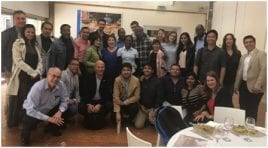
Twenty four participants, including eight women and sixteen men, were selected from almost ninety applicants.
The 2018 course had representatives from twenty-one countries: Ethiopia, Nepal, Uganda, Kyrgyzstan, Tanzania, Ukraine, Colombia, India, Vietnam, El Salvador, Panama, Honduras, Belarus, Argentina, Zambia, Trinidad & Tobago, Azerbaijan, Dominican Republic, Kenya, The Philippines, and Guatemala. This was the most countries we have ever had represented in one course.
The participants were all professionals, working for government, non-governmental organizations, decision-making bodies, academia and the private sector.
The workshop exposed participants to topics such as the strategic role of renewable energy including policy tools and trends; energy security: economics and project management; small and large scale technologies; bio-gas uses and waste to energy; entrepreneurship in the renewable energy field; plus lab and fieldwork experiences.
The group toured a variety of professional sites including: HomeBiogas; Seakura – sustainable marine agriculture farm; the wind farm at Maaleh Gilboa; Ashalim thermo-solar power station; energy efficient building at the Sde Boker campus of Ben-Gurion University; Ketura Sun 5 MW and Ketura Solar 40 MW solar fields; Kibbutz Elifaz hydroponics and wind energy; Kibbutz Lotan Center for Creative Ecology; and the Vidor Center for Agriculture in the central Arava.
Highlights of the course also included a 3-part workshop on Development Skills lead by researchers Suleiman Halasah and Rina Kedem; sessions about Judaism and Zionism with Rabbi Michael Cohen; a guided Jerusalem old city tour with one of our inspiring Israel Ride guides Jared Goldfarb; MASHAV culture night with kibbutz members joining to learn from participants about their cultures; and group presentations and a final ceremony in Jerusalem attended by the Director of MASHAV’s training programs, Ambassador Peleg Lewi in addition to ambassadors and consulate representatives from four consulates in Israel.
By all accounts, the 2018 course was our most successful one thus far. The participants left the Arava Institute and Israel inspired and equipped to advance Renewable Energy projects in their own countries.
Congratulations to the MASHAV team: Dr. Shmuel Brenner, Dr. Tareq Abu Hamed, Tali Adini, Avigail Ben Yohanan, Abby Lutman, and Reut Parnes for implementing this extremely successful course.
*MASHAV: Israel's Agency for International Development Cooperation, known as MASHAV in its Hebrew acronym, was founded in 1958 as part of the Ministry of Foreign Affairs. It is responsible for initiating and implementing Israel's development cooperation program worldwide. MASHAV aims at transferring the expertise and technologies that have assisted Israel in its own path to development to other countries.

